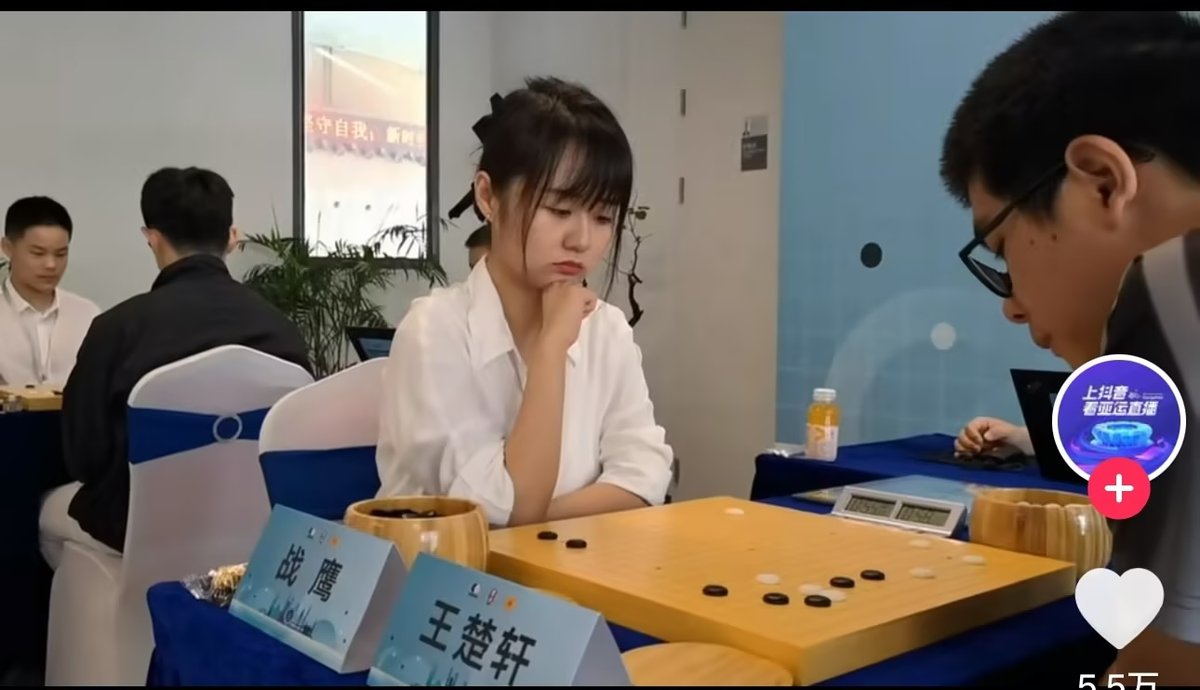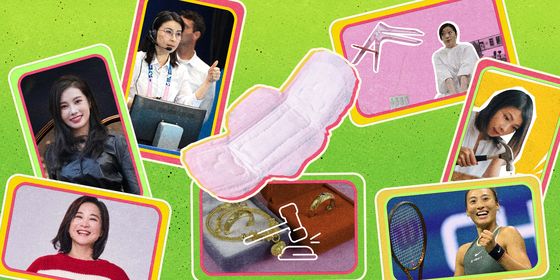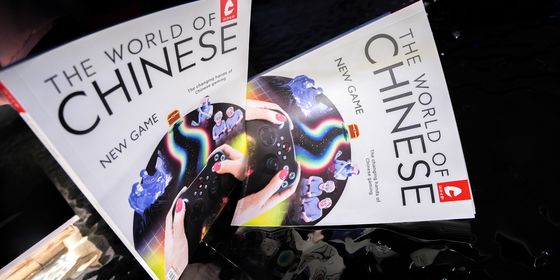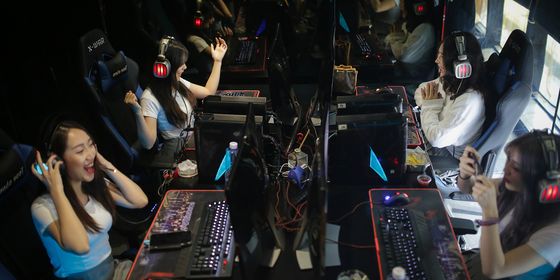Does a Go player’s crowning as “Hupu Goddess” signal that men in China are choosing brains over looks?
Li Shuhao, a tech industry worker from Shenzhen, Guangdong province, doesn’t know much about the game of Go. But he still took the day off work to attend a local master championship of the ancient strategy game on September 21.
Despite the main event being closed to the public, he still got to the venue around 10 a.m. and watched the livestream on his phone outside with approximately 30 other men. After waiting for two hours under the sun, Li finally got to see what he came for—his idol, Zhan Ying, a female professional Go player-turned-livestreamer, and, most recently, the winner of this year’s “Hupu Goddess” contest.
With a total of 1.8 million votes from Li and fellow fans, the Go player won the title by a landslide, receiving 24 times the votes of last year’s winner Liu Yifei, the actress who played the title character in Disney’s live-action movie Mulan. The result has drawn the public’s attention once again to the competition, which has been heavily criticized for objectifying women—with netizens divided on whether the inclusion of a sports figure is a sign of positive change.
Founded in 2016, the annual Hupu Goddess (虎扑女神) competition pairs up female celebrities from around the world in tournament-style brackets, allowing users to vote for their preferred contestant until a single “Goddess” is crowned. There are no criteria for the competition, but it’s generally believed that users vote based mainly on the celebrity’s physical appearance.
Because over 90 percent of Hupu’s users are male, the competition is often regarded by netizens as the standard for the aesthetic preferences of China’s heterosexual men. The finalists and winners in the past have always been prominent actresses such as Liu Yifei, Taiwan actress Alyssa Chia, and Gao Yuanyuan, known for her role in the wuxia TV series The Sword and the Knife, until Zhan’s surprising win this year.
With her small round face and straight bangs, Zhan’s image and identity as a professional Go player differed from the previous “goddesses,” leading some to see her win as a signal for positive change in how Chinese men define beauty and in the type of users that the platform is targeting. “Hupu is giving positive vibes. To be honest, in terms of appearance, she may not be as striking as the other finalists...she is cute, self-aware, and intelligent. This shows that appearance isn’t everything,” goes one comment on Weibo, China’s Twitter-like microblogging platform, on Zhan’s win.
Others, though, feel that the change—if any—is only skin deep. “In my opinion, she actually shares a similar aesthetic that the typical straight guy prefers deep down. She is smart but still has that non-aggressive girl-next-door vibe that guys look for in a partner,” a feminist blogger on the social media platform Xiaohongshu, who goes by the name of Nainai, tells TWOC. Nainai is not a frequent user of Hupu but sees screenshots of the conversations from Hupu on other social media platforms like Weibo and Douban.
Despite being a professional Go player, Zhan is better known to her fans as a livestreamer who engages in comedic behaviors during sessions, like trying to open a package of sausages with dramatic expression or cosplaying characters from anime.
Born in 1995 in Hebei province, Zhan, whose name literally translates to “war hawk,” has achieved only a second dan ranking (a measure of a player’s skill level on a scale of 1 to 9, with 9 being the highest) after eight years of playing, a relatively low level within the professional field.
“She’s not very good among the professionals. But if she keeps training, she does have a certain level of competitiveness among female players,” says Chen Jiawei, a Go player who trained with Zhan when they were younger.
Zhan started to host livestream sessions on the video streaming platform Bilibili in 2021, usually commentating on Go games and sharing stories from her own life. However, she didn’t rise to major popularity until August 2022, with a clip of her crying while reading critical comments from the online forum Tieba, which called her an “an amateur without any natural gift of playing skills” who “can only make a living through livestreaming.” A repost of the clip on Bilibili now has over 2.7 million views and Zhan has since accrued 1 million followers on the platform.
Founded in 2004, Hupu has evolved from a basketball forum into a discussion hub encompassing various topics, ranging from sports to politics and social issues. As a male-dominated platform, Hupu has long been criticized for its misogynistic content. One of its most popular sections, Hupu Pedestrian Street (虎扑步行街), which also hosts the Goddess contest, is typically flooded with posts of male users asking others to rate their girlfriends, sharing stories of unfaithful partners, and recounting their experiences chatting up women who are out of their league.
The scant number of female users on the platform report constant harassment and discrimination, even under sports-related topics. Nainai considers the Goddess contest to be the epitome of the prevalent “male gaze” of the platform: “Just take a look at their selections, you can tell all the girls they chose are basically either sweet and sexy, without any particularly strong aggressiveness,” she says.
Voters of the contest, on the other hand, deny that there is a gender perspective to their participation. Zhou, a college senior from Jiangsu province who agreed to be interviewed under his last name, has been a Hupu user since 2018. He voted for Liu Yifei in the past and became a fan of Zhan in 2022.
“Personally, I think this is just like supporting your idol,” Zhou tells TWOC.
Li, the tech industry worker, echoes the idea. Though he had known of the contest for years, he had never participated in it until this year due to a lack of interest in celebrities. As an avid fan of Zhan, he wanted to show his support. “I wanted her to win a championship,” says Li. “I’ll vote for her again next year if she’s in the contest.”
As for Zhan’s girl-next-door image, both Li and Zhou, who discovered Zhan through her crying video, find it an accessible part of her personality, as they resonate with her struggle. “It’s like you’re trying your best but others just see it as a joke. Internet culture still focuses more on the results than the process,” Zhou tells TWOC.
Nainai points out that Zhan’s win this year is also a marketing strategy for Hupu, which named “beauty that defies definition” as this year’s contest theme. “With the rise in feminist awareness, platforms like Hupu can no longer get away with openly conducting beauty pageants without facing criticism,” she tells TWOC, “From the looks of it, it might seem that Hupu as a platform is favoring intelligence over appearance. But the core [of the contest] remains the same.”
Ironically, after Zhan’s win, posts questioning her appearance and the point of the contests started to circulate on Hupu.
“I can’t really associate Zhan Ying with the word ‘goddess.’ Her personality is quite common in life. Not to mention her appearance, which is a 5 out of 10,” one user wrote on the platform.














